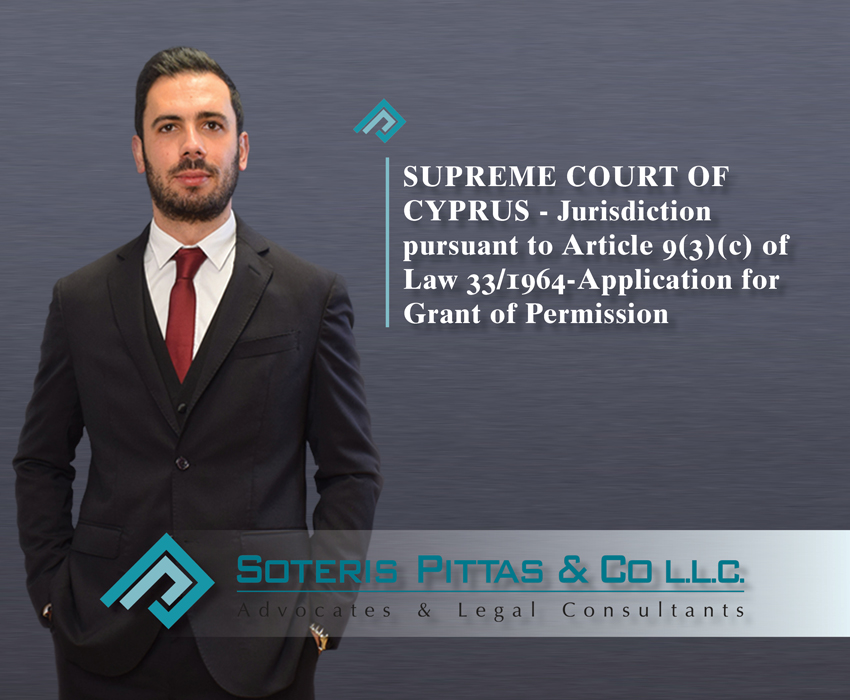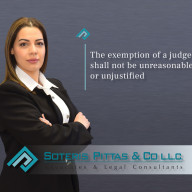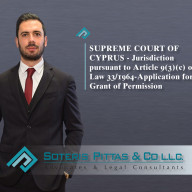On July 1, 2023, the Procedure Rules of the Supreme Court of 2023 were published in the Official Gazette of the Republic of Cyprus and entered into force. According to the said Procedure Rules, from July 1, 2023, the Supreme Court has the jurisdiction and power, among others, to decide pursuant to Article 9(3)(c) of the Law 33/1964, on third and final instance, on the basis of a request, which is submitted by the Attorney General of the Republic Cyprus or any of the parties following permission granted by him and following a previous civil or criminal appeal process on legal issues which arise from the decision of the Court of Appeal and are related to the differentiation of standing jurisprudence or to the need for a correct interpretation, either of a primary or secondary substantive legislative provision, or to a major issue of public interest or general public importance or coherence of the law on conflicting or contradictory decisions of Court of Appeal, in the civil or criminal jurisdiction exercised under it:
It is not that, in accordance with the above, the submitted application must clearly appeal the legal issues arising from the relevant decision, as well as the full grounds and the necessary evidence supporting the request, in order for the Supreme Court to decide whether it will decide to grant the requested permission;
It is further provided that, in such case, the decision of the Court of Appeal is replaced by the decision of the Supreme Court;
In the very recent decision of the Supreme Court dated January 30, 2024 under its jurisdiction pursuant to Article 9(3)(c) of Law 33/1964 examining the Application under no. 2/2023 for granting permission, the Supreme Court pointed out that as it appears from the wording of the article in question, the jurisdiction of the Supreme Court concerns the resolution of legal issues and that these legal issues must arise from the decision of the Court of Appeal. It further stated that these legal matters should be related to:
- the differentiation of standing jurisprudence, or
- the need for a correct interpretation, whether primary or secondary, of a substantial legislative provision, or
- a major issue of public interest, or
- a matter of general public importance, or
- a question of coherence of law on conflicting or contradictory decisions of the Court of Appeal.
In the said judgment the Supreme Court stated that the application for leave must clearly identify these legal issues and also specify the full reasons and necessary evidence supporting the request.
In the said Application, through the Report of Legal Matters attached to the Application for a leave, two issues were mentioned. Specifically, the following issues were mentioned:
(a) The Court of Appeals did not judicially review the petition for stay, ignoring the most important legal issue raised by the Petitioners with the petition for stay.
(b) The Court of Appeal interpreted the conclusion of the First Instance court's decision on the stay application from: "the application in relation to the legal fees is dismissed” to "is not dismissed" and thus held that there is no issue for review or jurisdiction.
The conclusion of the Supreme Court in the said Application for Grant of Leave was that the said Report did not clearly identify legal issues and that a leave cannot be granted to consider an undefined issue. In addition, it stated that the content of the Report constitutes a denunciation of the Court of Appeal's decision, as if it were an appeal against the Court of Appeal's decision. Therefore, the Application was dismissed.
It also stated that it is not the task of the Supreme Court to attempt to raise a legal issue, as defined in Article 9(3)(c) of the Laws, which could potentially arise on the basis of the specific appeal decision.
For further information on this topic please contact
Mrs. Christodoulos Neofytou( cneofytou@pittaslegal.com ) at SOTERIS PITTAS & CO LLC,
by telephone (+357 25 028460) or by fax (+357 25 028461)
The content of this article is intended to provide a general guide to the subject matter. Specialist advise should be sought about your specific circumstances.















